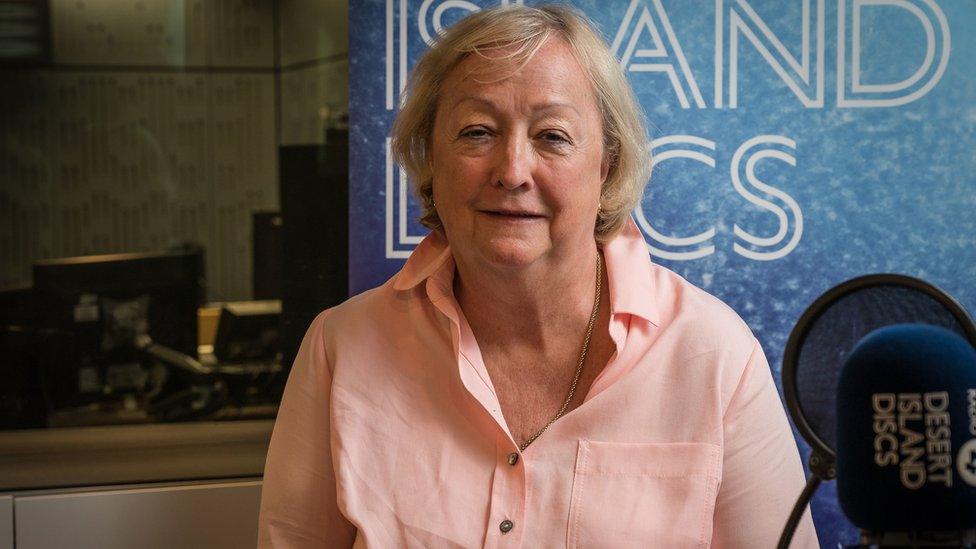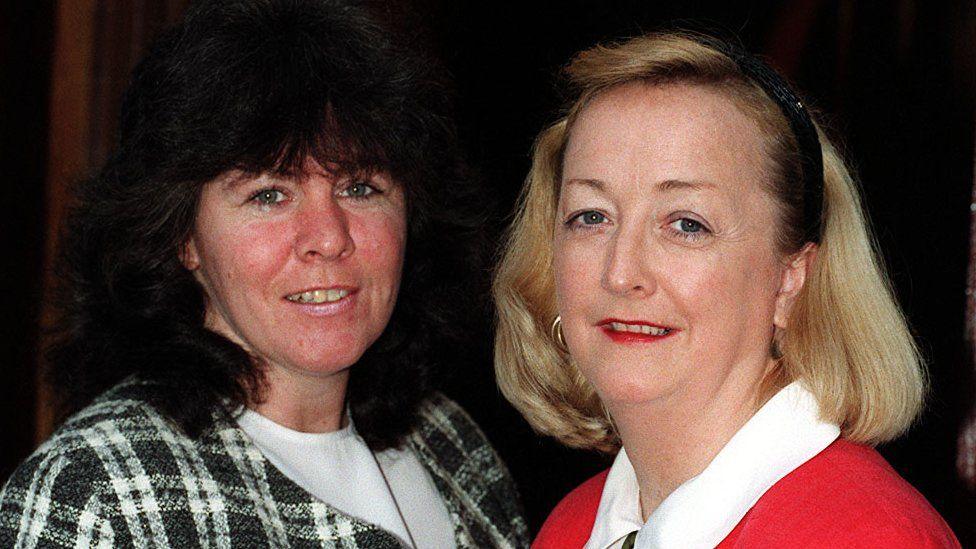Monica McWilliams: 'I was an ordinary woman in an extraordinary time'
- Published

Monica McWilliams
Monica McWilliams learned a lesson early in life from her cattle dealer father that stood her in good stead when she became part of the negotiations leading to the Good Friday Agreement.
When farmers in the cattle mart made a deal "they spat on their hands and slapped their hands together. Their word was held, that was their honour".
In an interview with BBC Talkback's William Crawley, the peacemaker and campaigner for women's rights describes the route she took that led her to the frenzied days of talks culminating in the signing of the peace deal in 1998.
Monica McWilliams grew up in Garvagh, County Londonderry, a mixed community village where neighbours helped each other out but there were two chemists, two grocery shops and two dentists "and you didn't really cross over to the other".
She developed an interest in politics when she was still at school and was present at an anti-internment march in Magilligan Strand in January 1972, just a week before Bloody Sunday.
CS gas and rubber bullets
"I saw violence that a young 15-year-old shouldn't have seen when CS gas was fired and rubber bullets were fired," she says.
A degree in town planning at Queen's University Belfast resulted in a scholarship to the University of Michigan in the United States.
An African-American professor brought her into his class of black students.
In the professor's view, because she was from Belfast: "I was someone who could identify with what we now call Black Lives Matter
"There I was in the middle of Detroit and I saw racism almost the equivalent of what I saw here in terms of sectarianism, and it was shocking."

Belfast social worker Pearl Sagar founded the NI Women's Coalition with Monica McWilliams
Back in Northern Ireland, Prof McWilliams found herself in a dead-end job selling encyclopaedias door-to-door.
It was her mother who saw an advert for a post teaching housing policy and social policy at Ulster Polytechnic, now the Ulster University.
"I stayed for 40 years. It was great and I had wonderful colleagues," she says.
Even so, on her first day in the job the head of department asked her to make the tea as the only woman on the staff.
"That attitude was right through in terms of management. They had this view that you should only hire women before they have babies because after that they're finished," Prof McWilliams explains.
Unsurprisingly perhaps, her activism turned towards the women's movement.
Sex discrimination
"We decided to campaign for the Sex Discrimination Act to come to Northern Ireland in 1975," she says.
In 1976 the Sex Discrimination Order outlawed discrimination on the grounds of sex in Northern Ireland.
"You can either change from the inside or you can change from the outside and I do both. It's not either/or," Prof McWilliams says.
The decision to form a political grouping to contest elections ahead of the peace talks which began in 1996 and culminated in the Good Friday Agreement came at very short notice.
"I was one of those who was writing about the importance of having women in politics, and along came this opportunity where you had to put yourself on the line," she explains.
"We decided to have a vanguard action where we would form ourselves into a cross-community coalition, we couldn't believe that we would get elected".

Monica McWilliams campaigning in south Belfast ahead of the 1998 assembly election
Just six weeks after the Women's Coalition came together, they won two seats.
"I was absolutely delighted that we were in a position where we could change things and make proposals to a peace agreement," she says, adding that without the Women's Coalition the rights of victims "wouldn't have been recognised".
Prof McWilliams thinks the agreement would still be passed if it were put to the public today.
"We had suffered enough - 30 years. It was a huge challenge. There was something in it for everyone, but there was pain in it for everyone," she says.
Of her own role in the building of peace in Northern Ireland, Prof McWilliams says: "I was a very ordinary woman who ended up in an extraordinary time."